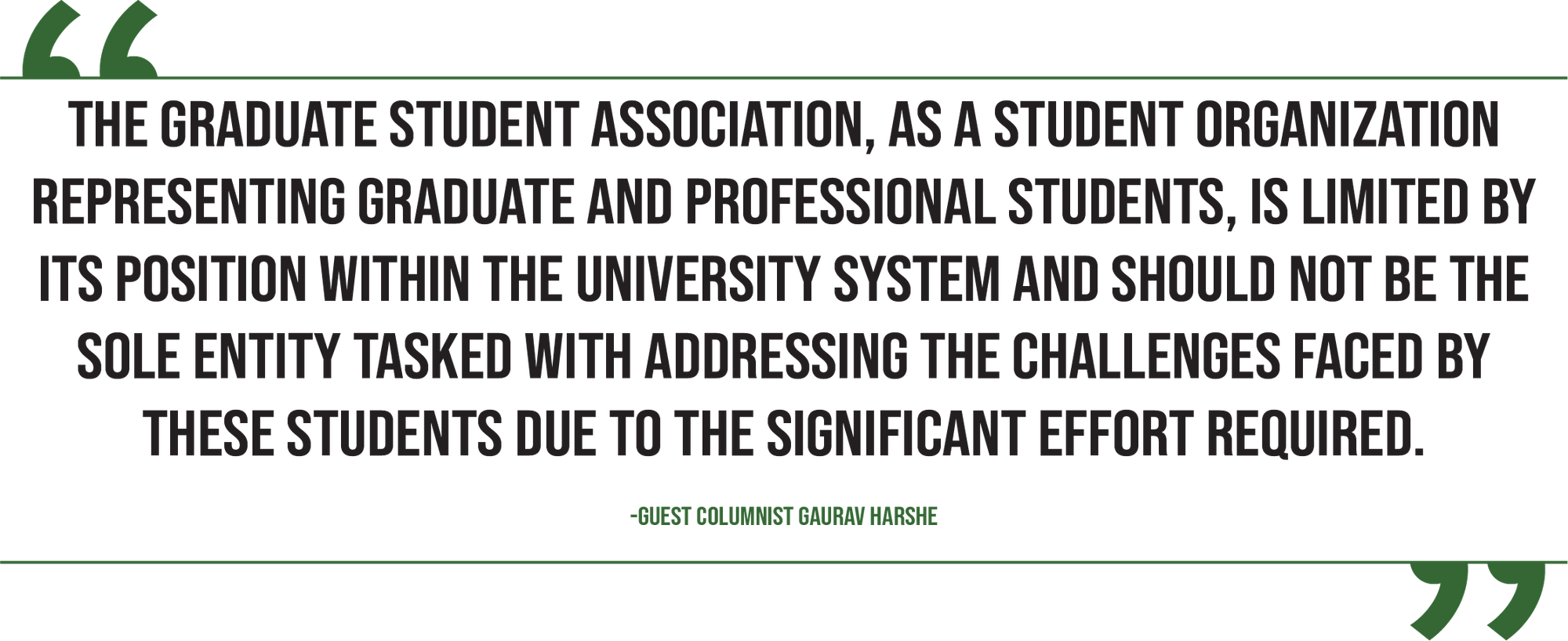Graduate and professional students, often secluded within their departmental labs, are an integral part of the university's student community, yet their needs and voices frequently remain overlooked and underrepresented.
To bridge this gap, the Graduate Student Association hosted a town hall meeting on Feb. 26, aiming to directly hear from its constituents. The meeting addressed several issues, such as health insurance, stipends and tuition, and basic needs insecurities.
The association has accomplished so much as an organization. At the town hall meeting, the president of the association, Rajat Das Gupta, shared some key achievements over the past years, including the most recent update that would ensure a minimum annual stipend of $20,000 for Ph.D. students.
Other wins have been the blanket annual health insurance, outreach to colleges and departments to orient new students to the association and the multitude of identity-based events. Even though the organization has done so much, there are still many issues that need to be addressed.
One pressing issue raised was the cancellation of a Russell House room booking, which resulted in financial uncertainty for the Black Graduate Student Association’s social event, which now lacks a contingency plan. Better communication between the Russell House reservation system and the organization, in addition to teaching students how to use the 25Live system, would be a step in the right direction.
Another critical topic discussed was mental health resources.
Students highlighted the limitation of access to a certain number of therapy sessions during the fall and spring semesters, with no coverage available during the summer. The gap forces students to incur out-of-pocket expenses over the summer and restart therapy with a new therapist in the subsequent academic year, disrupting continuity of care.
The situation discourages some students from seeking mental health support and undermines the therapeutic progress of those who do, as they must transition away from therapists with whom they have developed trust.
A student shared that she had to pay out-of-pocket expenses even after having coverage because of technical difficulties with the insurance paperwork. The university Center for Health and Well Being could help solve these problems by better educating its student members on how to navigate the insurance, its benefits and limitations.
Graduate student leaders lack understanding of the Garnet Gate system's role in accessing the Graduate Student Association's funding, particularly concerning roster utilization, leading to challenges in securing funding amidst depleted Student Government funds.
Orientation sessions typically neglect to educate students about university-wide resources such as Garnet Gate despite the association's efforts to promote them through newsletters and listservs. These inconsistencies highlight the need for an improved communication strategy between the student’s academic department and other university-wide student affairs departments to better assist all the needs of graduate and professional students.
Some students raised the concern of requiring paid software for their courses and other research assistant work. The expenses were expected to be born by the students, resulting in hundreds of dollars annually. It was suggested that forming partnerships with the IT office to provide remote access to computers could be a potential solution.
Food access and insecurity have been a consistent and sometimes acute concern for some graduate and professional students.
The university can provide resources to address food insecurity concerns by establishing a tap-access food pantry exclusively for graduate students across different campus locations, especially considering the highly over-proportioned usage of the Gamecock CommUnity Shop.
Financial insecurity emerged as a significant concern among graduate students, impacting areas such as housing, parking, stipends and work hours. The discrepancy between rising rental prices and stagnant stipend amounts has heightened worries, making it difficult for students to concentrate on their studies and work due to ongoing housing insecurity.
The idea of private partnerships, such as those with 650 Lincoln or Park Place, that benefit undergraduate students was suggested as a potential solution. Several students pointed out that resolving the graduate housing dilemma could alleviate financial strain, as many currently spend over half their stipends on rent, which complicates efforts to advocate for stipend increases.
The inadequacy of stipends has forced some students to take on a second job clandestinely, risking contract violations and negatively impacting their academic and research performance.
One student highlighted the toll this situation takes on personal life, leaving no time to build friendships or engage in social activities. The recently introduced annual stipend floor of $20,000 only covers assistantships for students enrolled in Ph.D. programs, thus leaving out all other doctoral and master's students.
University leadership can be instrumental in its advocacy with college and departmental leadership to ensure students get paid at least a living wage and, at best, one that places a premium on their talents. One student highlighted the challenge of affording a vehicle due to insufficient financial support after their three-year funding period ended.
Parking issues were also brought to light, with the distant graduate student lot and its frequent capture for gameday parking causing additional stress for those commuting from off-campus locations. Students living near campus without a car voiced concerns about the unreliability of campus shuttles and Comet buses, highlighting the widespread impact of these financial and logistical challenges in their day-to-day lives.
The Graduate Student Association, as a student organization representing graduate and professional students, is limited by its position within the university system and should not be the sole entity tasked with addressing the challenges faced by these students due to the significant effort required.

To effectively tackle issues related to basic-need insecurities and to uphold the dignity of graduate and professional students, it is essential to involve other organizational units both within and outside the campus.

